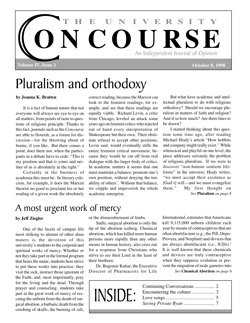Love Never Leaves
by Kathleen van Schaijik
Once I heard a husband say something about dying one day, and his wife of twenty-some years, who heard the remark, said right away: “I couldn’t live without you, dear.” He tried to pass the thing off lightly: “Oh, sure you could.” But she was serious: “No. I couldn’t.”
I was only sixteen at the time, and I remember feeling shy, as if I had intruded on a too-intimate moment between spouses. At the same time I was conscious of being deeply moved by the revelation of their love for one another-by the unexpected vision of hearts and lives so thoroughly intertwined that the mere mention of loss was unbearable. The scene remains a personal icon of marriage for me-framed and displayed, as it were, in the section of my mental gallery dedicated to the essence of spousal love.
Then the other day I happened to hear on the radio the popular tune: “Tell me, how could I live without you? If you ever leave…how could I live?” The melody is appealing, and the words are very similar to the ones I heard at sixteen. And again I experienced in myself a kind of embarrassed inner recoiling from the too-personal nature of the sentiment being expressed. But this time, it was an embarrassment of a very different sort. Whereas the words in the first instance struck me as a revelation of something beautiful and exalted, these seemed rather an exposure of something degrading and pitiful. Why? What is the difference?
Someone will say, “That is the difference between a sixteen year old romantic and a thirty two year old cynic.” But that’s not it at all. I am still touched whenever I think of that little scene with that middle-aged couple. And, now having been married nine years, I have experienced myself the kind of love I glimpsed between them. I have participated in the mystery of two souls living “as one flesh.” I have felt the insupportable agony-that instantaneous horrible knotting of the insides-when my husband is late coming home and the thought flashes through my mind: “What if something’s happened to him?” I know first hand that the dread of being bereft is an essential characteristic of a deep human love.
So why does the contemporary tune not strike a chord? Why does it make me feel sorry for the singer, and inclined to lament a culture that so ignorantly and self-defeatingly excludes itself from the greatest and most profound experience this side of the Jordan River? The key, I think, lies in the contrast between the lines “if you died” and “if you ever leave.” The wife who said she wouldn’t be able to live without her husband had no fear whatsoever of his leaving. She was totally secure-so secure, so “rooted and established” in her husband’s love, that she could not imagine her life without him. In her dread of his death there was no hint of despair.
The pop lyrics, on the other hand, seem to have been written by a young woman who has staked her entire life and happiness on a man whose commitment is uncertain. He might leave. The song is pervaded by a subtle but unmistakable angst. Its creator is not simply expressing the intensity of her devotion; she is pleading with her lover not to abandon her. This is why we pity her: both because she could very well be in for some serious heartache, and because she has held herself too cheaply. She has “spent her money on what is not bread.” She has given too much in exchange for too little.
People will tell me to lighten up, it’s just a song; you think too much. But in my opinion we think far too little about such things these days. We absorb uncritically. We wax sentimental over froth and sap and pay no attention to the assumptions beneath, and the logic of their influence on us and on our culture.
No doubt I would have loved the song were I still in high school. At sentimental-sixteen, I could be impressed by real love when I saw it, but I would not have been able to distinguish it clearly from its counterfeits. Now I can.
“How firm a foundation ye saints of the Lord is laid for your faith by His excellent Word!” The religious reality captured in this line of the old hymn has its exact parallel in spousal love. The “excellent word” the indissoluble oath, the “I do swear until death” is the only foundation firm enough to sustain conjugal “faith.” Anything less involves us in a ruinous self-squandering. Don’t fall for it.
Kathleen (Healy) van Schaijik, who graduated from FUS in 1988, is editor-in-chief of the Concourse. She lives with her husband and four children in The Netherlands.


